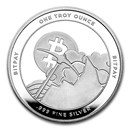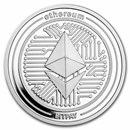Cryptocurrencies Silver Rounds

| Quantity | Check/Wire |
|---|---|
| 1 - 19 | $31.63 |
| 20 - 99 | $31.33 |
| 100 - 499 | $31.03 |
| 500 + | $30.63 |

| Quantity | Check/Wire |
|---|---|
| 1 - 19 | $32.63 |
| 20 - 99 | $32.33 |
| 100 - 499 | $32.03 |
| 500 + | $31.63 |

| Quantity | Check/Wire |
|---|---|
| 1 - 19 | $32.63 |
| 20 - 99 | $32.33 |
| 100 - 499 | $32.03 |
| 500 + | $31.63 |

| Quantity | Check/Wire |
|---|---|
| 1 - 19 | $32.63 |
| 20 - 99 | $32.33 |
| 100 - 499 | $32.03 |
| 500 + | $31.63 |

| Quantity | Check/Wire |
|---|---|
| 1 - 19 | $31.63 |
| 20 - 99 | $31.33 |
| 100 - 499 | $31.03 |
| 500 + | $30.63 |

| Quantity | Check/Wire |
|---|---|
| 1 - 19 | $32.63 |
| 20 - 99 | $32.33 |
| 100 - 499 | $32.03 |
| 500 + | $31.63 |
Cryptocurrency Silver Rounds
Celebrate the innovative creation that has changed the financial industry with this line of Cryptocurrency silver rounds. Cryptocurrencies are digital or virtual currencies that use cryptographic techniques for secure financial transactions. They operate on decentralized networks based on blockchain technology, which ensures transparency, security, and immutability of transactions. The most well-known cryptocurrency is Bitcoin, but there are thousands of others, including Ethereum, Ripple, Litecoin, and more.
Given the popularity of both cryptocurrencies and precious metals like silver, this series of silver rounds has become popular among collectors. Each coin depicts a detailed design and logo for the individual cryptocurrency that pays homage to the evolution of this currency.
Silver Rounds vs Silver Coins
Silver rounds and silver coins are both popular forms of investment in precious metals, particularly silver, but they have some fundamental differences.
Silver Coins:
Silver coins are official legal tender issued and guaranteed by a government or a central authority. These coins often bear a face value and are recognized as official currency in the issuing country. They are produced by government mints and have a specific weight, purity, and design approved by the government. Some well-known examples of silver coins include the American Silver Eagle, Canadian Silver Maple Leaf, and Austrian Silver Philharmonic.
Key Differences:
- Legal Tender Status: Silver coins have a legal tender status, which means they can be used to settle debts or transactions at their face value. However, their intrinsic value, which is based on the silver content, is typically higher than their face value.
- Government Backing: Silver coins are backed by the issuing government, providing an additional layer of trust and credibility to their value.
- Collectibility and Numismatic Value: Some silver coins, especially those with historical significance or limited mintages, may carry numismatic value and be sought after by collectors. This can influence their market price beyond their metal content.
Silver Rounds:
Silver rounds, on the other hand, are privately minted and not considered legal tender. They are produced by private mints and do not have a face value. Silver rounds are similar to coins in appearance but lack the official government backing and recognition.
Key Differences:
- Non-Legal Tender Status: Silver rounds are not recognized as official currency and cannot be used for transactions in the same way as coins.
- Private Minting: Silver rounds are produced by private mints, which means they do not carry the same government guarantees as official coins.
- Simplicity and Purity: Silver rounds often have simpler designs compared to coins, and their focus is on the silver's weight and purity (e.g., 1 oz .999 fine silver).
- Lower Premiums: Silver rounds may have lower premiums over the spot price of silver compared to silver coins, making them more cost-effective for investors seeking exposure to the metal.
In summary, while both silver coins and silver rounds contain precious silver, silver coins are official legal tender issued by governments with recognized face values, whereas silver rounds are privately minted and lack legal tender status. The choice between the two depends on individual preferences, investment goals, and interest in numismatics.
Benefits to Investing in Silver Rounds
Investing in silver rounds offers several benefits. Firstly, silver rounds provide an affordable and accessible way to invest in physical silver, as they often have lower premiums compared to official silver coins. Secondly, they come in various designs and sizes, making them attractive to collectors and offering aesthetic value. Additionally, silver rounds typically contain .999 fine silver, ensuring high purity and maintaining their intrinsic value as according to the live silver spot prices. As private mint products, silver rounds are not subject to the same production limits as government-issued coins, making them more readily available.
Furthermore, investing in physical silver provides a tangible asset that can act as a hedge against inflation and economic uncertainties. Finally, silver rounds are easily traded, allowing investors to liquidate their holdings relatively easily when needed, making them a flexible addition to a diversified investment portfolio.



